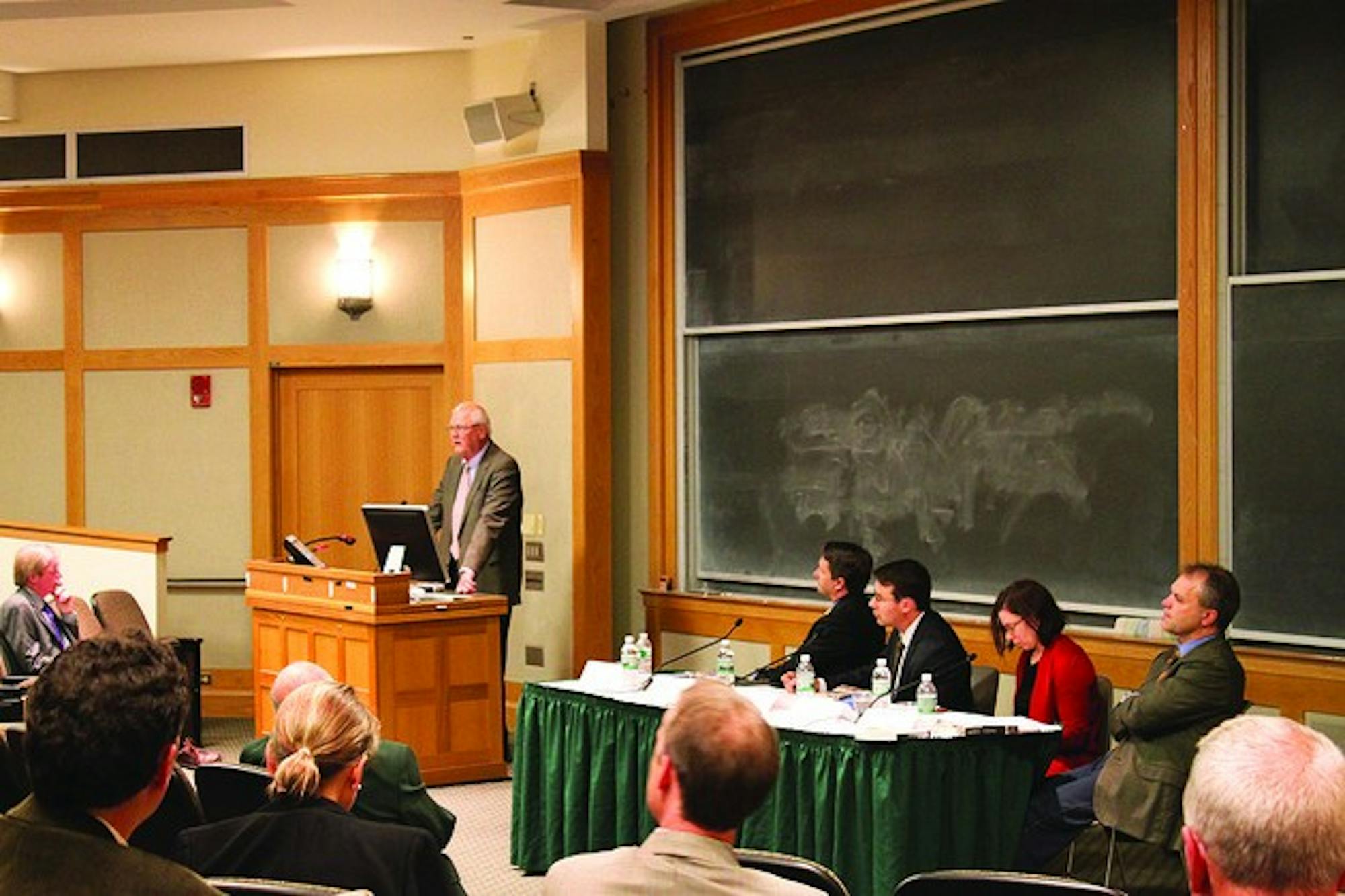The event highlighted important themes of Wright's recent book, "Those Who Have Borne The Battle: A History of America's Wars and Those Who Fought Them." The symposium opened Friday in Filene Auditorium with a roundtable discussion featuring Wright and Lt. Col. John Nagl, a U.S. Naval Academy Minerva Research Fellow. On Saturday, Dartmouth faculty lectured and presented papers on military history in Carson Hall.
A former Marine, Wright has been visiting veterans' hospitals since 2005 to encourage veterans to continue their education, he said in an interview. Through his interactions with veterans and his extensive teaching experience, he noticed that there was little written information regarding veterans' service to the United States, he said. The absence of literature moved Wright to publish his new book.
"The book focuses on how America has decided who will fight our wars for us, and, more importantly, how we choose to honor and support our veterans," government professor Benjamin Valentino said during the symposium.
During the roundtable discussion, Wright discussed how the nature of war has changed in recent years. Modern warfare has become increasingly tragic and impersonal, especially as technology magnifies the scale of war, he said.
"The wars beginning with [the Korean War] have been in response to an implicit or presumed threat," Wright said, noting that in recent wars Congress has not issued a formal declaration of war to authorize the use of force.
Wright said that most Americans do not understand the defensive nature of counterinsurgency. The wars in which the United States is currently involved are not driven by territorial objectives and have shifted from conquering to nation-building, he said.
Wright also said that the removal of the draft has changed the demographics of the armed forces, which have become less representative of the population as a whole. Many soldiers come from rural areas in the southern and western regions of the country and tend to have less formal education, he said.
Nagl, who authored the influential "Counterinsurgency Field Manual," said that the United States military was not strategically equipped to fight less-traditional wars such as those in the second half of the 20th century.
"The only purpose of war is to build a better peace," Nagl said, quoting St. Augustine. "We were unprepared to do that in Iraq and Afghanistan."
Nagl commended the current generation of servicemen and women, which is entirely composed of volunteers. Despite the challenges facing the armed forces, recruiting has remained strong in the last decade, and recruiters often must turn away aspiring soldiers, according to Nagl.
The unemployment rate is higher among veterans than among the general population. Nagl emphasized the importance of events like the symposium in supporting veterans after they return to civilian life.
"We must hold in our hearts those who have paid a heavy price so that the rest of us can live with freedom," Nagl said. "They have borne a heavy burden, and we cannot adequately repay them. But we can and we must do all in our power to ease their cares after their exceptional service in this time of war."
Government professor Russell Muirhead said that appreciation for the nation's soldiers should be independent of the objectives of combat.
"There is a powerful tendency to connect our soldiers to the purposes they are serving," he said. "This is the wrong way to think about it."
Women's and gender studies and geography professor Jennifer Fluri said she was struck by how abstract war has become in American society. Although she assigns articles about Iraq and Afghanistan to her students, she noticed that many do not think about these conflicts regularly even though these wars have been ongoing for most of their lives.
She applauded Wright for beginning a national dialogue about the U.S. military that will hopefully change, or at least challenge, the existing perception of veterans.
The message of the symposium resonated with Army Capt. Stoney Portis, a student in the Master's of Arts and Liberal Studies program. Portis said he appreciated the themes that were discussed and felt that Wright's book will be meaningful for veterans nationwide.
"In the end, it will introduce a dialogue for where servicemen and women fit into the national picture," Portis said.
Lectures on Saturday included "Steal or Starve: The Role and Significance of Sanctioned Stealing in the Training of Spartan Soldiers," by professor Paul Christesen; "Civil War Soldiers and the Failed Romance of War," by professor Colleen Boggs; "Patriotic Vistas: Soldierly Gazes and Glimpses of the U.S. Civil War," by professor Robert Bonner; "Democracy Shall Be No Empty Romance: World War I Veterans and Popular Protests in the British Caribbean," by professor Reena Goldthree; "Extending the Living Force of Americanism: The Nationalist Internationalism of the Early American Legion," by visiting fellow Trygve Throntveit; "From the Glorious Few to a Democracy of Death: How Western Nations Have Treated Their War Dead," by professor Ron Edsforth; and "Sacrifice, Reconciliation and the Politics of Reform: Veterans and Memories of the Vietnam War in Contemporary Vietnam," by professor Edward Miller.
The event was sponsored by the Nachman Fund in History, the Leslie Center for the Humanities and the Rockefeller Center.




